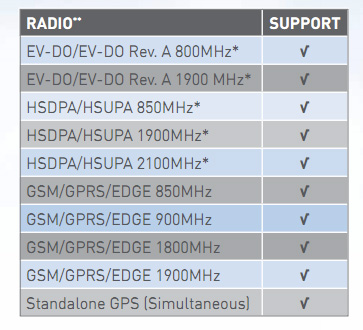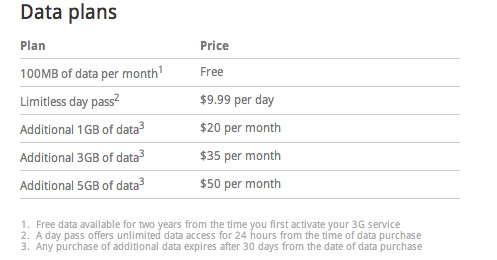Anand's Thoughts on Google's Chrome OS
by Anand Lal Shimpi on December 8, 2010 6:23 PM ESTConnectivity Brilliance: Free Cellular Data with Every Chrome Notebook
Chrome OS relies on you using a web browser for all of your PC usage and as a result, is more dependent on internet access. Thankfully the smartphone revolution has positively impacted wireless data availability and Google is capitalizing on that.
All Chrome OS systems will offer both WiFi and cellular data connections. Initial Chrome hardware will feature Qualcomm’s Gobi modem which supports the following networks:

Gobi also provides GPS so you get the same sort of data access and connectivity that you would on a smartphone. To be honest it’s a shame that all existing notebook manufacturers don’t provided this sort of access. I’d hope that availability of Chrome notebooks would change this for everyone.
In addition, Google extended its already far-too-cozy partnership with Verizon to enable a pretty sweet deal for Chrome notebook users. For the first two years of ownership, once you activate 3G service, you’ll get 100MB of free data transfers every month with your Chrome notebook. If you’re mostly using the web in locations where you have WiFi and just need to rely on 3G occasionally, this may actually be enough to get you by.
Verizon will also offer unlimited data $9.99 day passes with no recurring billing/contract required. If you want more monthly data the pricing is as follows:

I have to say that Google and Verizon’s proposed data plans are probably the most reasonable I’ve seen from anyone. If the pricing on Chrome notebooks is right, the free 100MB/month of 3G transfers will be a major selling point for casual users.










104 Comments
View All Comments
Hrel - Monday, December 13, 2010 - link
I thought Microsoft was going to do that Sandboxed browser/apps thing way back when Vista came out. I remember specifically reading that that was one of the features of Vista and why it was so important to make sure your CPU supported virtualization.Alas that never came to pass; now we're here in Windows 7 reading leaked info about Windows 8 and it STILL hasn't happened. For shame $soft, for shame.
rscoot - Monday, December 13, 2010 - link
The "I'm not an idiot, so I don't need to run antivirus" opinion is horribly outdated. With as many 0 day exploits and drive by hijackings from legitimate websites you can't just say, "I don't search for horse porn and download warez I'm ok" anymore. Unless you don't use any PDF or Flash software (just for a couple of examples) on your PC, you are going to be at risk. Is your risk as high as the average user's? Of course not, but considering how cheap good antivirus software is (Microsoft Security Essentials is free and low footprint), the only reason not to run AV is to cultivate the smug attitude that you're better than people who choose to protect themselves.TantrumusMaximus - Tuesday, December 14, 2010 - link
To all of you who commented on the fact Google will house all your personal information... "I SALUTE YOU"I love my right, my personal right TO USE A CAPS LOCK key when I want to.
I love my right on my PC - PERSONAL Computer to do things "I" want to do today without handing my data to big brother to review every last action I make.
This world is soooooo moving towards the evil futures in many movies where the government makes all your choices for you, knows when you wipe your a$$, knows when you banged your wife, knows all.
SCREW THIS. I hope it burns.
has407 - Saturday, January 1, 2011 - link
Anand -- Thanks again for the food for thought. I too am impatient to get to the end of the story. But I think the trajectory is ordained; timing is the only question. (Timing, not trajectory, seems to always be the most difficult. I remember pontificating in 1998 that, "with 2MBps ubiquitous connectivity, I could jettison most of the weight, power and data storage I have to lug around with my laptop--which is always out of sync with my other machines--grrr. We should be there by 2004-2005". Hah! ever the techno-optimist. :)Will it replace everything else? No. But IMHO that is irrelevant. The relevant question is: Where will the growth be in the coming years? That growth will be--and demonstrably has been for some time--in services and apps that are web-based or anytime/anywhere (which is simply another way of saying "cloud-based"). That's where the developers and development $ will go, because that's what the vast majority of people want and expect (and will increasingly want and expect).
Yeah, I'll still have my home-based Linux/Win/etc infrastructure, but for most tasks I don't need it, don't (and can't) want to have to lug it around when mobile. That's speaking as an individual... From a corporate perspective there are plenty of options, e.g., "hybrid clouds". But the hard facts are that most organizations--especially smaller organizations--can't provide equivalent SLA's or performance at equivalent cost as public cloud. The differences in economies are off-the-charts compared to what any but the largest organizations can achieve.
See, e.g., "Above the Clouds: A Berkeley View of Cloud Computing":
http://www.eecs.berkeley.edu/Pubs/TechRpts/2009/EE...
Maybe there will be a swing of the pendulum back towards something like "person clouds", but my crystal ball doesn't go that far out. :)